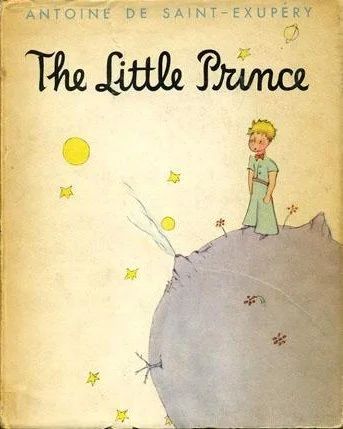Why Do Empaths Ignore Intuition, And Wish They Hadn’t?
When I was little, my grandpa was one of my favorite people. He wasn’t my biological grandpa, but that didn’t matter to either of us. When we went walking, he would smoke a cigar, which was one of our special secrets. No one, especially grandma, ever found out.
When I was in primary school, he gave me The Little Prince by Antoine de Saint-Exupéry (Reynal & Hitchcock, 1943). He said, “I know you’ll understand this,” and he was right. I treasured the book. The golden-haired Little Prince, visiting Earth from a small planet, was one of first empaths I ever met. The story is ethereally beautiful, but for today, let me call to mind the reason the Little Prince left his home, and why he decided to return.
A rose grew spontaneously in his garden, and the Little Prince fell in love with it. She was rather demanding and something of a hypochondriac. Over time, the Little Prince began to fear that she was taking advantage of his empathic nature, to make him tend to her all the time. The more she demanded of him, the more he wanted to explore the universe. So he stopped letting his love guide his actions, and took off.
Empaths deal with this exact same problem all the time.
Empaths Are Different
Empaths know they’re empaths by the time they’re about four years old. They don’t have the words to intellectualize it, of course, but that doesn’t really matter. An empath’s internal dialog is not based on words. It’s based on feelings. And empaths feel everything, deeply and personally.
So, even at four, you fully experience yourself as an empath. Most other people think you’re an alien. They have no idea who or what you are. You do not react to situations the way they do, and so you’re incomprehensible. When I was a child, there was a great deal of stress in my household. But I didn’t merely process what was directed at me. I was mostly concerned with my sister. Even as a child, I intuitively knew that she needed me to sing to her every night. That became the only way she could fall asleep. I clearly remember how good that made me feel. I had purpose, and I had the ability to fulfill my purpose, and it was wonderful.
Empaths are able to absorb other people’s pain into themselves, which makes the other person feel better. Most people have to give their pain to someone to get rid of it. They learn not to give it to people who would use it to hurt them more. They can’t give it people who would be hurt by it, because those people don’t make themselves available.
So they give it to you, because you offer to take it. And you offer because you know you can heal yourself from it. You know that you can metabolize their pain, and it’s true. You draw power by singing to others when they are crying and frightened. You will listen and care, and you will ask for nothing in return. You were born this way, and it is so different, it’s freakish. They used to burn us at the stake.
The Problem With Intuition
So what happens to a person like you as you grow into adulthood? Well, at several points along the way, you have times when you feel like the Little Prince. It seems like the roses in your life are asking for too much. Everyone has always told you to “toughen up,” and, sometimes, it seems like they have a point.
But really, the voice telling you to “be normal” is your mom, or society, or authority figures or religious figures, telling you not to fall in line with who you are. Part of your attempt to be normal is to think in terms of “being taken advantage of.” While this might seem like practical guidance, acting on it has dire consequences for an empath. It’s not you. If you think in those terms, you’re not being true to yourself.
This is why it can be so difficult for an empath to follow their intuition. Empaths feel their intuition, so it’s hard to understand the need to explain it intellectually. When you are cornered and forced to justify yourself with a logical discourse (complete with footnotes), you can’t construct the argument. If you have cornered yourself, which is so often the case, you might throw up your hands and, intellectually, decide that since you can’t defend yourself with logic, you have lost the debate.
You internalize all the “toughen up” voices from your past. None of them is your intuition. If you act upon those voices, and “toughen up,” maybe even admonishing some of the roses you love, or leaving them, you’ll hurt yourself even more. Later, when you realize that you didn’t follow your true intuition, and you regret it, this is what actually happened.
You can always tell what your true intuition is. Always. You might not like what it’s saying—but you will always know which voice is truly yours. There aren’t many people like you around, and your intuition is going to lead you in directions that seem insane to others.
The hard part is having the courage to follow it, no matter what. Being an empath is difficult. People see your kindness and your tears, and they mistake that for weakness. In fact, you have mystical abilities to heal others and yourself. In some ways, you are one of the toughest people in the world. You didn’t ask to be like this. You were born this way. The judgement about being an “incomprehensible alien” comes from outside of you.
You stumble when you internalize it. Instead, trust your intuition, even when that means trusting it with your life. Especially when that means trusting it with your life.
Your Intuition
Your intuition is connected to something greater than you. You’ve always known this, too. If there’s some religion or dogma stuck to this knowledge, I’d encourage you to peel that away for a moment so you can feel the essence of it. No words, just you and the universe.
When you’re being completely authentic, you’re giving. You’re also receiving, even if the way you receive is not the same as others. When you see that you have healed someone else, and when they realize that you healed them, that’s love taking a beautiful form, unique to you. A lot of pain is exchanged, true. But your soul will always know how to heal itself. Your challenge is to let it.
That’s what happened to the Little Prince. After he left his rose, he visited several planets before he came to Earth. On each one, he met a grown-up trapped in some “toughen up” way of thinking. But after talking with de Saint-Exupéry in the Sahara for a week, he realized that he had left his rose because he had listened to “toughen up” voices in his mind, and not his own intuition. He remembered how much he loved his rose. More importantly, he remembered how much his rose loved him. She expressed her love as best she could, and even though that was less than perfect, it was true love. He decides to go back to her.
That love is why you’re here. Know this. You’re an empath. Once you get that this is you, it’s ok — just, all the sudden, you’re ok with yourself. You have to give yourself permission to be who you are. You’re here to be a very special person. The world may not understand you, but the world needs you. Now, more than ever before.






